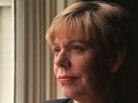-
카렌 암스트롱(Karen Armstrong)의 새 책, "The Case For God" - from npr.org學而時習之不亦悅乎/기타등등 2009. 9. 29. 09:30암스트롱 아줌마가 새 책을 하나 들고 나왔다.도대체 언제부터 이 아줌마 책을 안 읽었는지는 모르겠다.처음에는 열광했으나 점차 심드렁해지고 있다.본인이야 아니라고 하지만 어쩔 수 없는 타자화에 기분이 상했던 건가.어쨌든, 이 글을 가지고 온 까닭은 1. 아줌마 책 냈다고, 2. 북리뷰의 수미쌍관 초큼 구리다고, 3. npr의 멋진 녹음 들으면서 영어공부도 하라고, 4. 특히, 영어로 발음하는 인명 (이를테면 아리스토텔레스, 토마스 아퀴나스, 코페르니쿠스 같은 인간들) 좀 들어보라고, 5. 사실 atheism과 fundamentalism을 동급에 넣어둬서 삐쳤다는 사실을 알리려고. -_-;
An Exhaustive, Invigorating 'Case For God'
The Case for God
By Karen Armstrong
Hardcover, 432 pages
Knopf/Random House, Inc.
List price: $27.95
Read An Excerpt
When I was 10, I used to stare up at the stars and try to imagine what infinity looked like. "What if our solar system is really just an atom in an even bigger solar system?"
The vast unknowability of the universe made me shiver. It was thrilling.
In her new book, The Case for God, Karen Armstrong argues that this very attempt to imagine the unimaginable and grasp the sacred cosmic order is like an attempt to know God. God, she writes, is "utterly transcendent. ... It is inaccurate to call God the Supreme Being because God is not a being at all."
It's heady stuff. Armstrong is a former nun turned ecumenical scholar. The Case for God, she writes, is intended to "bring something fresh to the table" amid the world's current religious contention.
Armstrong disdains fundamentalism and atheism, but she's not out to add to the shouting match. Her book is a call for a new practice of theology — one that embraces uncertainty and "truly speaks to all the complex needs of our time."
Surprisingly, she suspects we can achieve this by looking backward.
Until the modern era, Armstrong claims, religion was not something people thought, but something we did. It was a series of practices and rituals designed to help us "discover new capacities of mind and heart." And God was unknowable — undefinable, in fact.
It wasn't until the 16th century, she argues, that we began to see God as more of a personality. Science and religion were pitted against each other, and the Bible was read literally. These, she writes, have resulted in both extremism and atheism. Yet if we can learn from the past, perhaps we can "return to a theology that asserts less and is more open to silence." Perhaps we can better experience the ecstasy of God.
This is a tall order. But Armstrong is ambitious. The Case for God is an entire semester at college packed into a single book — a voluminous, dizzying intellectual history.
Beginning with the Paleolithic era, Armstrong documents the evolution of theology right up to today. From the Indian Aryans, Confucius and the Old Testament, she moves on to Plato, Aristotle, St. Augustine.
It's a whirlwind tour of philosophy. Pit stops are made along the way to explain the authorship of the Torah, the Holy Trinity and the etymology of the word "faith." Then we're off again! Virtually every great prophet, poet and scientist makes an appearance: Thomas Aquinas, Spinoza, Muhammad, Copernicus, Darwin, Einstein — right up to Derrida.
It's an exhaustive but lucid work. Reading The Case for God, I felt smarter. How could I not? It is so much about so much.
Yet it's not without flaw. Theology, after all, hasn't been shaped by ideas alone; political and economic concerns have always influenced doctrine. Yet Armstrong never acknowledges this. She presents religious thought unfolding in a pristine, intellectual bubble — as a dance between mythos and rationality only. This is a sinful omission.
No matter. Given the subject, readers will probably see in Armstrong's book what they want to. To some, it will be a jeremiad against spiritual laziness. To others, blasphemy. To me, The Case for God is a stimulating, hopeful work. After I finished it, I felt inspired. I stopped, and I looked up at the stars again. And I wondered what could be.
Susan Jane Gilman is the author of the new memoir Undress Me in the Temple of Heaven.
http://www.npr.org/templates/story/story.php?storyId=112913841
반응형'學而時習之不亦悅乎 > 기타등등' 카테고리의 다른 글
책을 읽을 때 (6) 2009.12.12 황지우 - 버라이어티 쇼, 1984 (0) 2009.05.14 문예 사조 (0) 2009.03.09